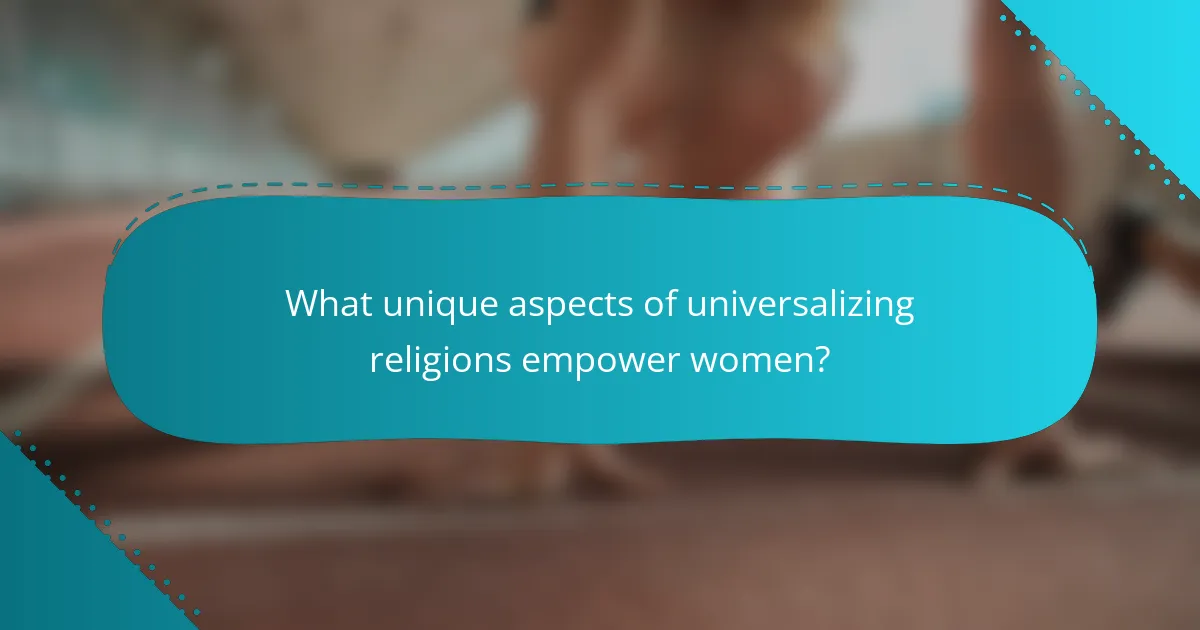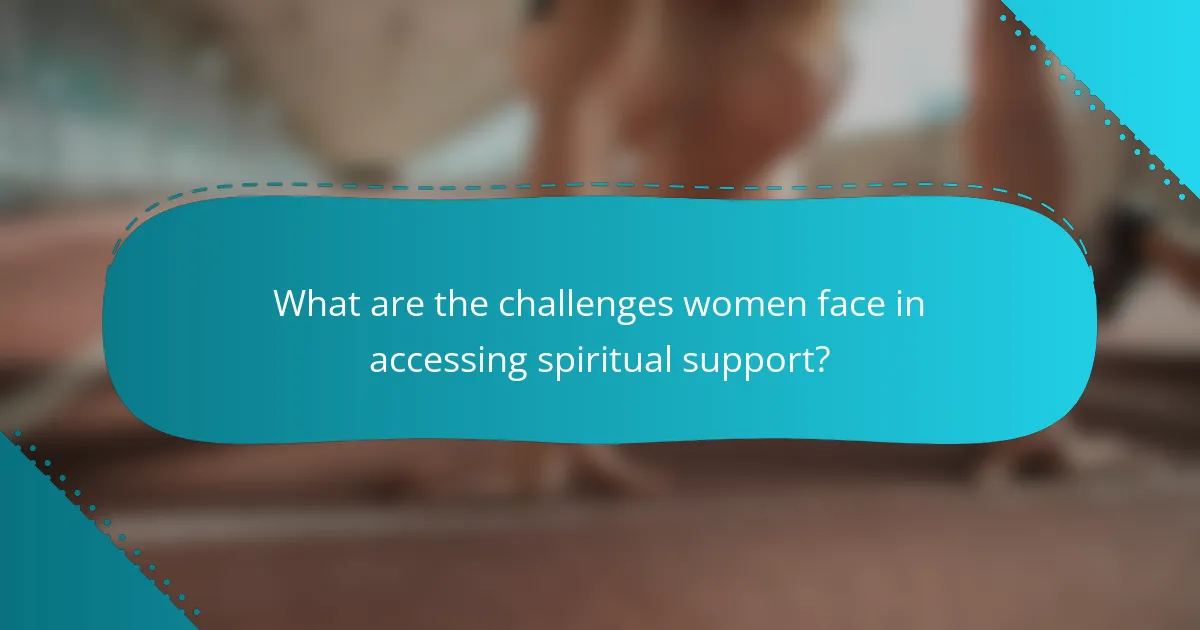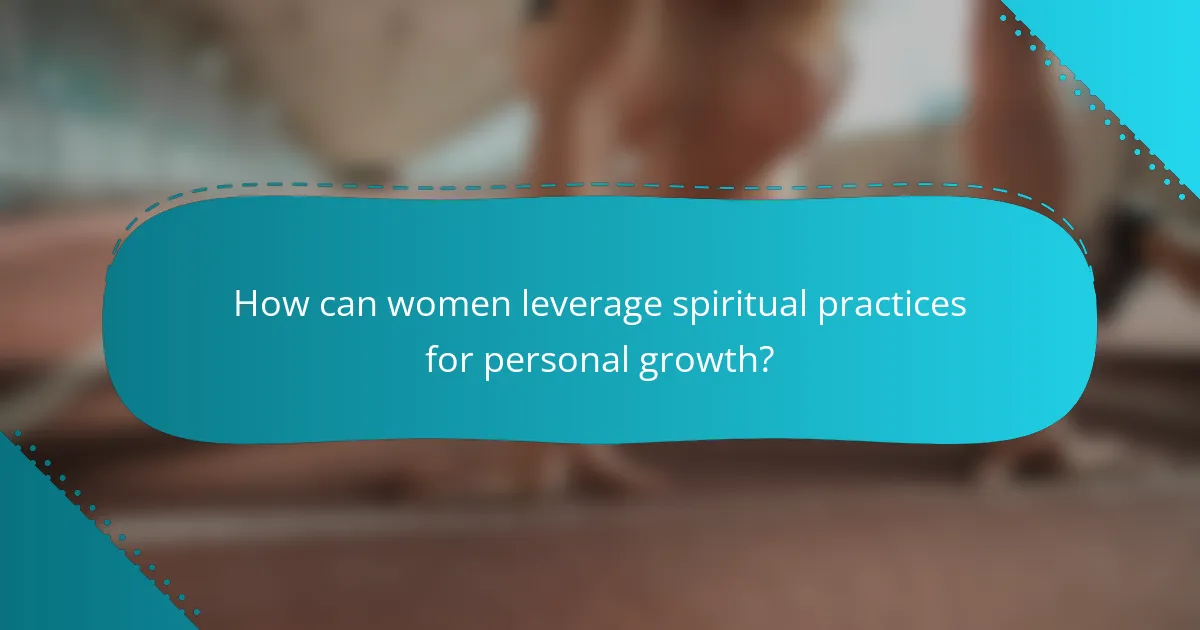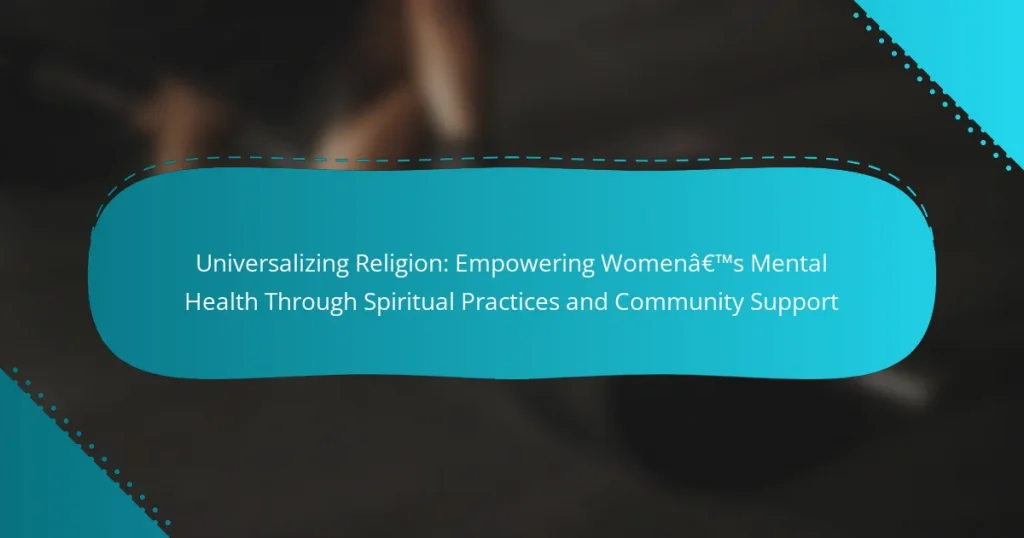Universalizing religion can significantly enhance women’s mental health by fostering community support and providing emotional resources. Spiritual practices like meditation and prayer promote resilience and mindfulness, which are crucial for well-being. Women engaged in these communities often report lower anxiety and depression levels, highlighting the importance of collective faith practices. Addressing barriers to spiritual support is essential for empowering women to fully benefit from these resources.

How Can Universalizing Religion Enhance Women’s Mental Health?
Universalizing religion can significantly enhance women’s mental health by fostering a sense of belonging and providing emotional support. Spiritual practices in these religions often promote mindfulness and resilience, which are essential for mental well-being. Community support within universalizing religions creates networks that empower women, offering resources and encouragement during challenging times. Studies show that women engaged in spiritual communities report lower levels of anxiety and depression, highlighting the unique attribute of collective faith practices in improving mental health outcomes.
What are the key spiritual practices that support mental wellness?
Key spiritual practices that support mental wellness include meditation, prayer, community gatherings, and mindfulness. These practices empower women by fostering a sense of belonging and emotional support. Meditation enhances self-awareness, while prayer offers solace and hope. Community gatherings create connections, reducing feelings of isolation. Mindfulness promotes present-moment awareness, alleviating stress and anxiety. Collectively, these practices contribute to improved mental health and resilience.
In what ways does community support play a role in mental health?
Community support significantly enhances mental health by fostering connection, reducing isolation, and providing resources. Spiritual practices within religious communities empower women by offering a safe space for emotional expression and shared experiences. Engaging in communal activities can lead to improved self-esteem and resilience. For instance, studies show that women involved in supportive religious groups report lower levels of anxiety and depression. This unique attribute of community support highlights its critical role in promoting mental well-being among women through shared spiritual practices.

What are the universal attributes of spiritual practices in promoting wellness?
Spiritual practices universally promote wellness by enhancing mental health, fostering community, and empowering individuals. These practices often include meditation, prayer, and communal gatherings, which provide emotional support and a sense of belonging.
Research indicates that women engaging in spiritual practices report lower levels of anxiety and depression, highlighting their unique benefits. Additionally, these practices create safe spaces for women to share experiences, facilitating personal growth and resilience.
Moreover, the integration of spirituality into mental health care can lead to improved coping strategies and overall life satisfaction. This approach acknowledges the holistic nature of wellness, addressing both psychological and spiritual needs.
In summary, spiritual practices serve as a vital tool for promoting wellness, especially among women, by fostering community support and enhancing mental health resilience.
How do meditation and prayer contribute to emotional stability?
Meditation and prayer significantly enhance emotional stability by fostering mindfulness and connection. These practices cultivate a sense of inner peace and promote resilience against stress. Regular engagement in meditation can lower anxiety levels, while prayer often provides community support, reinforcing emotional well-being. Studies indicate that individuals who integrate these spiritual practices report higher levels of life satisfaction and emotional balance.
What role does mindfulness play in spiritual practices?
Mindfulness enhances spiritual practices by fostering self-awareness and emotional regulation. It empowers women to connect deeply with their spirituality, promoting mental health through community support. Mindfulness practices, such as meditation and breathing exercises, cultivate presence and reduce anxiety. As a result, women experience improved emotional resilience and a sense of belonging within their spiritual communities. This unique attribute of mindfulness creates a transformative space for healing and empowerment.

What unique aspects of universalizing religions empower women?
Universalizing religions uniquely empower women by fostering community support and enhancing mental health through spiritual practices. These religions often emphasize equality, providing women with roles in leadership and decision-making. For instance, many universalizing faiths promote social justice, encouraging women to advocate for their rights. This active participation can lead to improved self-esteem and mental well-being. Additionally, community support networks within these religions offer emotional and social resources, creating safe spaces for women to express their experiences and challenges.
How do rituals and traditions foster a sense of belonging?
Rituals and traditions create a sense of belonging by fostering community connections and shared experiences. They empower women through spiritual practices, enhancing mental health support. Engaging in collective rituals reinforces identity and solidarity, leading to stronger emotional bonds. These practices also provide a unique space for women to express their challenges and triumphs, promoting resilience and mutual support.
What leadership opportunities exist for women within these communities?
Women in these communities can engage in various leadership roles that enhance their mental health and spiritual growth. Opportunities include leading support groups, organizing community events, and facilitating workshops focused on spiritual practices. These roles empower women to share their experiences and foster connections. Additionally, women can take on mentorship positions, guiding others in their journeys. Such leadership not only supports individual well-being but also strengthens community bonds. Community organizations often encourage female leadership, recognizing its unique benefits in nurturing mental health through collective spiritual practices.

What rare attributes make spiritual practices particularly effective for women?
Spiritual practices uniquely empower women’s mental health by fostering community, enhancing emotional resilience, and promoting self-discovery. These rare attributes create a supportive environment that encourages shared experiences and collective healing. Women often find strength in communal rituals, which can reduce feelings of isolation, thereby improving overall mental well-being. Additionally, practices like mindfulness and meditation specifically tailored for women address unique stressors, enhancing emotional balance and clarity.
How do interfaith dialogues enhance understanding and support?
Interfaith dialogues enhance understanding and support by fostering empathy and collaboration among diverse religious communities. These interactions create safe spaces for sharing experiences, which can improve women’s mental health through spiritual practices and community networks. As a result, participants often report increased awareness of mental health issues and shared strategies for coping. This collaboration can lead to unique support systems that empower women, promoting holistic well-being.
What innovative community initiatives have emerged to support women’s mental health?
Innovative community initiatives supporting women’s mental health often integrate spiritual practices and collective support. Programs like women’s circles foster connection through shared experiences and guided meditation. Local faith-based organizations offer workshops combining mental health education with spiritual guidance. Furthermore, online platforms provide virtual support groups that emphasize community and shared spirituality. These initiatives enhance resilience and promote mental well-being among women.

What are the challenges women face in accessing spiritual support?
Women face significant challenges in accessing spiritual support, including societal stigma, limited resources, and lack of representation in spiritual communities. These barriers hinder their ability to benefit from spiritual practices that can enhance mental health. For example, many women encounter judgment when seeking support, which discourages them from engaging in spiritual activities. Additionally, some spiritual communities may not fully embrace women’s experiences, leading to feelings of isolation. As a result, addressing these challenges is crucial for empowering women to utilize spiritual support effectively.
How can cultural barriers impact women’s engagement with spiritual practices?
Cultural barriers can significantly hinder women’s engagement with spiritual practices. These barriers often stem from societal norms, religious interpretations, and access limitations. Women may face restrictions based on cultural expectations that prioritize male participation in spiritual activities.
Additionally, language differences and lack of representation in leadership roles can further alienate women from spiritual communities. For example, in some cultures, women may feel unwelcome in spaces dominated by male voices.
As a result, the potential benefits of spiritual practices, such as improved mental health and community support, may remain inaccessible. Addressing these barriers is crucial for empowering women and enhancing their spiritual engagement.
What misconceptions exist about women’s roles in religious communities?
Misconceptions about women’s roles in religious communities often undermine their contributions. Many believe women are solely submissive, ignoring their active participation in spiritual practices and community support. Research indicates that women often lead initiatives that promote mental health and well-being within these settings. For instance, women frequently organize events that foster communal ties and provide emotional support, challenging the stereotype of passivity. These dynamics reveal a unique attribute of women’s roles: they empower not only themselves but also their communities through spiritual engagement.

How can women leverage spiritual practices for personal growth?
Women can leverage spiritual practices for personal growth by fostering community support and enhancing mental health. Engaging in practices such as meditation, prayer, and group rituals can create a sense of belonging and purpose. Research indicates that women who participate in spiritual communities report higher levels of emotional well-being. Additionally, spiritual practices often promote self-reflection, which can lead to greater self-awareness and personal development. By integrating these practices into their lives, women can cultivate resilience and navigate life’s challenges more effectively.
What strategies can women adopt to integrate spirituality into daily life?
Women can integrate spirituality into daily life by establishing daily rituals, engaging in community support, and practicing mindfulness. Daily rituals, such as meditation or prayer, foster connection and mental clarity. Community support, through groups or networks, enhances shared experiences and emotional resilience. Mindfulness practices, like yoga or journaling, cultivate self-awareness and inner peace. These strategies empower women to enhance their mental health through consistent spiritual engagement.
What steps can be taken to create a supportive community?
Creating a supportive community involves several key steps. First, foster open communication by encouraging members to share experiences and challenges. Second, organize regular gatherings or workshops focused on spiritual practices that promote mental health, enhancing connection among participants. Third, provide resources such as counseling or support groups tailored to women’s mental health needs. Lastly, recognize and celebrate individual achievements within the community to build confidence and solidarity.
What common mistakes should women avoid in their spiritual journeys?
Women should avoid comparing their spiritual journeys to others, neglecting self-care, and dismissing community support. Focusing on personal growth, setting realistic expectations, and embracing patience enhances mental health. Engaging with supportive communities fosters empowerment and connection, crucial for spiritual development.

What expert insights can guide women in their mental health journey?
Spiritual practices and community support significantly enhance women’s mental health. Engaging in collective rituals fosters connection and belonging, reducing feelings of isolation. Research shows that women who participate in faith-based communities report higher levels of emotional well-being. Unique attributes of these practices include mindfulness, prayer, and group meditation, which promote stress reduction and resilience. Additionally, women often find empowerment through shared experiences, creating supportive networks that facilitate open discussions about mental health challenges.
How can women find the right spiritual practices for their needs?
Women can find the right spiritual practices by exploring various traditions and communities that resonate with their personal beliefs. Engaging with practices such as meditation, mindfulness, or group rituals can enhance mental health and foster a sense of belonging. Research shows that women often benefit from supportive environments that encourage sharing and connection. Tailoring practices to individual needs, such as stress relief or personal growth, can empower women to cultivate their spiritual journeys effectively.
What resources are available for women seeking community support?
Women seeking community support can access various resources that enhance mental health through spiritual practices. Faith-based organizations often provide support groups, counseling services, and workshops focused on empowerment. Online platforms also offer virtual communities where women can share experiences and find encouragement. Local religious institutions frequently host events that promote mental well-being and foster connections among women. Additionally, mental health apps may integrate spiritual practices to support emotional resilience. These resources collectively empower women to build supportive networks that enhance their mental health and well-being.
What books and online platforms focus on women’s spiritual wellness?
Books and online platforms focusing on women’s spiritual wellness include resources that empower mental health through spiritual practices. Notable books are “Women Who Run with the Wolves” by Clarissa Pinkola Estés and “The Gifts of Imperfection” by Brené Brown. Online platforms like Insight Timer and Mindful offer community support and guided practices tailored for women. These resources emphasize connection, self-discovery, and holistic well-being.
What are the best practices for maintaining mental health through spirituality?
Engaging in spirituality can significantly enhance women’s mental health through community support and practices. Key best practices include participating in group rituals, fostering connections with like-minded individuals, and embracing mindfulness techniques. These activities promote emotional resilience and provide a sense of belonging. Engaging in spiritual discussions can also empower women, helping them articulate their experiences and challenges. Regular involvement in these practices can lead to improved mental well-being, lower stress levels, and a stronger support network.




